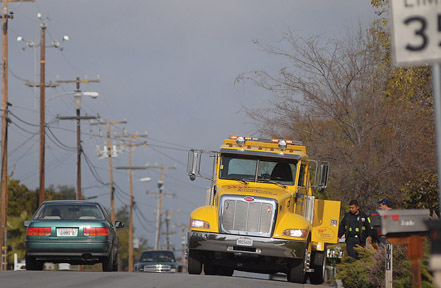
A guide to road rules that take effect in 2010
The New Year brings with it new laws and 2010 is no different.
Here are some of the laws that go into effective starting Jan.
1.
Many of the new laws are meant to change driver behavior on
California streets.
A guide to road rules that take effect in 2010
The New Year brings with it new laws and 2010 is no different. Here are some of the laws that go into effective starting Jan. 1.
Many of the new laws are meant to change driver behavior on California streets.
“The new laws are designed to make our roadways a safe place for motorists,” said Joe Farrow, the CHP commissioner, in a press statement. “Familiarize yourself with these laws and make 2010 a safe year for you and your loved ones.”
Below are summaries of a few of the significant changes for the upcoming year.
Driving Under the Influence (SB 598, Huff)
Effective July 1, 2010, this new law requires the Department of Motor Vehicles (DMV) to advise second- and third-time misdemeanor DUI offenders of the following options: obtain a restricted driver’s license that would allow driving after serving a 90-day suspension period for a second conviction of misdemeanor DUI, or a six-month suspension period for a third conviction of misdemeanor DUI if the violation only involves alcohol. The offender must enroll in a DUI program and the offender must install and maintain an IID in their vehicle.
Move Over/Slow Down (SB 159, Simitian)
The new law removes the Jan. 1, 2010, sunset date on Sections 21809 VC and 25253 VC. Section 21809 VC requires a person driving a vehicle on a freeway and approaching in a lane immediately adjacent to a stationary, authorized emergency vehicle that displays emergency lights, or a stationary tow truck that displays flashing amber warning lights, to safely make a lane change from that lane, or slow to a reasonable speed.
Section 25253 VC requires tow trucks used to tow disabled vehicles to be equipped with flashing amber warning lamps and authorizes tow trucks to display flashing amber warning lamps while providing service to a disabled vehicle. However, this section prohibits tow trucks from displaying flashing amber warning lamps on a freeway except when an unusual traffic hazard or extreme hazard exists.
Department of Transportation Vehicles (SB 240 Wright)
Currently as section 21809 VC (Move Over, Slow Down Law) requires a person who is driving a vehicle on a freeway and approaching in a lane immediately adjacent to a stationary, authorized emergency vehicle that displays emergency lights, or a stationary tow truck that displays flashing amber warning lights, to safely make a lane change from that lane, or slow to a reasonable speed. This new law adds a stationary, marked Caltrans vehicle displaying flashing amber warning lights to the “Move Over, Slow Down Law.”
Television Broadcast or Video Signal(AB 62 Portantino)
This new law allows a person to drive a motor vehicle with a television receiver, video monitor, television or video screen, or any other similar means of visually displaying a television broadcast or video signal if the equipment is designed, operated and configured in a manner that prevents the driver of the motor vehicle from viewing the television broadcast or video signal while operating the vehicle in a safe and reasonable manner.
Crimes Against Highway Workers – Assault and Battery (AB 561, Carter)
This new law amends section 2415 and 243.65 of the penal code to expand the definition of a highway worker to include employees of a city or county who perform specified activities related to local streets and roads. Additionally this new law includes in the definition of a highway worker, employees of a contractor while working under contract with Caltrans, contractors and employees of contractors while working under contract with a city or county and volunteers.
Personal Liability Immunity ( AB 83, Feuer)
Effective Aug. 6, 2009, this new law provides that a Good Samaritan who renders medical or non-medical care at the scene of an emergency would not be liable for any civil damages.
Charter Party Carriers (AB 636, Jones)
This new law requires the Public Utilities Commission (Commission) to permanently revoke a charter party carrier’s (CPC) authority to operate, or permanently bar it from receiving a permit or certificate; a CPC that operates a bus without having been issued the proper permit from the Commission; operates a bus with a suspended permit from the Commission; has committed three or more liability insurance violations within a two-year period for which they have been cited; operates a bus with a permit that was suspended by the Commission during a period that the CPC’s liability insurance has lapsed; has one or more buses improperly registered with the DMV; or knowingly employs a bus driver who does not have a current and valid driver’s license of the proper class, a passenger vehicle endorsement; or the proper certificate to drive a bus. The Commission would not be allowed to issue a new permit or certificate to operate as a CPC if any officer, director or owner of the CPC was an officer, director or owner of a CPC that has its authority to operate as a CPC permanently revoked or was permanently barred from receiving a permit or certificate from the Commission.
This bill would also require a person who drives a bus for a CPC without a current driver’s license of the proper class, a passenger vehicle endorsement, or the required certificate to have their privilege to operate any type of bus with passengers suspended for five years. AB 636 would provide provisions to allow a CPC to request a hearing from the Commission upon receipt of a notice or refusal or revocation of a permit to operate as a CPC. Additionally, AB 636 would allow California Highway Patrol (CHP) officers to impound a bus of a CPC for 30 days under specified conditions.
Toll Evasion Violations (AB 628, Block)
This new law permits vehicular crossings and toll highways operating in California to use a pay-by-plate toll system where motorists are identified by their vehicle license plate and billed or the toll is deducted from the Automatic Vehicle Identification (AVI) account. This law also provides that it is evidence of a violation for a person to enter a vehicular crossing or toll highway without at least one of the following: Money in an amount to pay the prescribed tolls, and transponder or other electronic toll payment device associated with a valid AVI account or a valid vehicle license plate properly affixed to the vehicle in accordance with current law.
Bicycles (SB 527, Kehoe)
This new law allows a person to ride a bicycle without a seat if the bicycle was designed by the manufacturer to be ridden without a seat.
Ignition Interlock Devices (IID) (AB 91, Feuer)
Effective July 1, 2010, this new law establishes a pilot program in the counties of Alameda, Los Angeles, Sacramento and Tulare from July 1, 2010 to January 1, 2016. The pilot program will require, as a condition of reissuing a restricted driver’s license, being issued a driver’s license, or having the privilege to operate a motor vehicle reinstated, subsequent to a conviction of any DUI offense; to install an IID in any vehicle, not including a motorcycle owned or operated by the offender. This new law also establishes installation requirements and requires the installer of the IID to notify the Department of Motor Vehicles (DMV) when the IID has been tampered with, bypassed or attempted to be removed. The length of time the IID would be required to be installed in the person’s vehicle is based upon the number of DUI convictions and whether the offense was a misdemeanor DUI or a felony DUI.
These points are only a synopsis of the new laws listed here, and only a partial list of new laws for 2010. For complete information on chaptered bills, enacted in 2009, please refer to the Legislative Counsel Web site at www.LegInfo.ca.gov.









